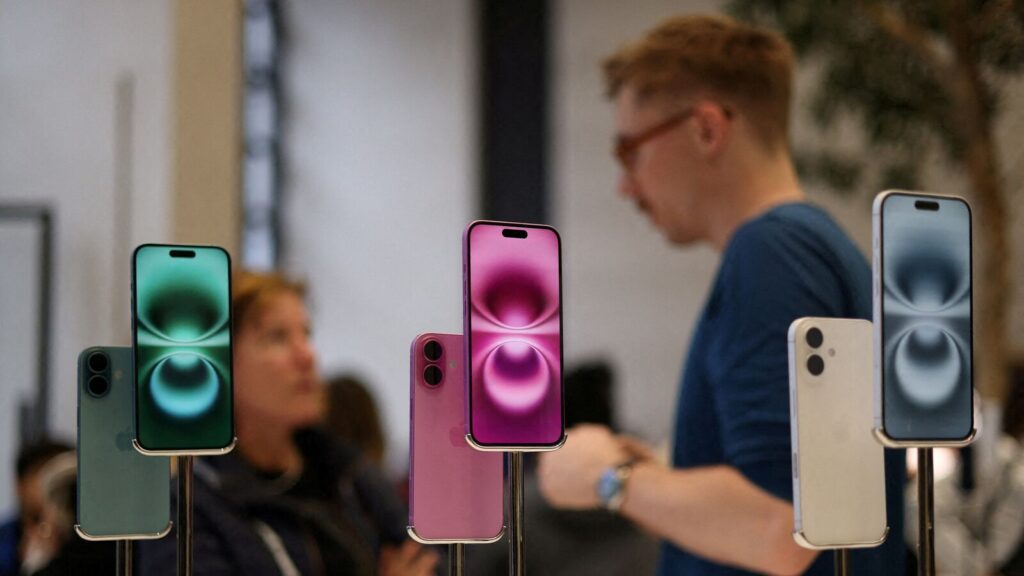Apple needs every iPhone to sell well. But if the world’s most valuable tech giant wants to gain a foothold in the artificial intelligence race, it really needs its latest creation to succeed.
This explains why the health of the new iPhone cycle is a key issue facing Apple ahead of its fourth quarter report scheduled for Thursday afternoon. Concerns are growing as data such as faster shipping times and earnings reports from wireless carriers suggest the iPhone 16 family won’t be flying off store shelves. KeyBanc Capital Markets’ Brandon Nispel on Friday gave his rating for Apple stock, citing in part data from AT&T, Verizon and T-Mobile that showed wireless upgrade rates in the U.S. fell 9% year-over-year in the third quarter. Downgraded to “sell”. “We believe this data suggests a slow path to upgrade,” Nispel wrote.
Things get even more complicated with the gradual launch of Apple’s first generative AI service. The first features of Apple Intelligence will be released this week, more than a month after iPhone 16 started shipping. Apple plans to continue adding AI features to its iOS software throughout next year, which could push iPhone 16 adoption longer than previous years. “The gradual introduction of AI capabilities may impede more significant upgrade cycles,” TD Cowen’s Krish Sankar wrote in a note to clients on Friday.
This concern is weighing on Apple stock. The stock has risen less than 5% since the iPhone 16 launch event in early September, lagging behind other megacap stocks and the S&P 500 at the time.
Apple has experienced slow iPhone cycles in the past, given the maturity of its business and the longer time it takes for consumers to upgrade. But the company’s hardware-centric business model means its devices are the only way to deliver generative AI services to customers, the most important of which is mobile phones. Those customers have to be willing to pay for that benefit. Only iPhone 15 and 16 models can host Apple Intelligence, and the average price for these models with various memory configurations is just over $1,000.
In contrast, Apple’s technology giants can distribute AI capabilities to a wide audience without such expensive additional fees. Meta Platforms, Facebook’s parent company, rolled out its Meta AI assistant for free to more than 10 countries last month, reaching nearly 3.3 billion daily active users worldwide.
As AI capabilities move from cloud services to “edge” devices such as smartphones and PCs, Apple has a natural advantage as one of the world’s leading manufacturers of such products. However, there are some doubts as to whether the current fleet of AI smartphones can truly offer powerful capabilities. “Unlike AI servers, smartphones lack high-speed memory and advanced packaging techniques that enable high-speed data transfer between AP and memory, limiting AI capabilities,” Jefferies analysts said. , Edison Lee said in a memo to customers earlier this month. He downgraded the company’s rating on Apple stock to “hold.” “In our view, it is premature to expect that AI will accelerate the smartphone replacement cycle.”
And despite the recent downturn, Apple’s stock price has risen nearly 36% over the past 12 months, and its parent company, Microsoft and Google, has been the most active of the big tech companies in incorporating generative AI into its products. It exceeds the alphabet. Apple trades at more than 31 times expected earnings for the next four quarters, 20% above the company’s average over the past five years, according to FactSet data.
Therefore, the stock still faces some risk if the iPhone 16 disappoints. The next earnings report is expected to include just over a week of sales results for the new model, which is typical for this time of year. Expectations are modest, but by no means low. Analysts estimate that iPhone sales in the September quarter rose 3% year-on-year, which is in line with the numbers the company posted in the same period last year.
A lot will go into what Apple says for the quarter ending in December, especially since the company hasn’t released specific financial projections. Analysts expect iPhone sales growth to accelerate, increasing 5% year-over-year to $73.2 billion, according to Visible Alpha’s consensus estimate.
But many have also noted signs that Apple may cut back on its production plans. “To be clear, we have not heard of any iPhone production cuts in the checks,” Morgan Stanley’s Eric Woodring said in a Tuesday report. “After tracking, we would characterize iPhone demand as mixed,” it said in a report Tuesday. He remains positive on Apple, calling the company “the best-positioned Edge AI winner over the next 12 months.”
It may take longer for Apple to prove the thesis correct.
Email Dan Gallagher at dan.gallagher@wsj.com.


